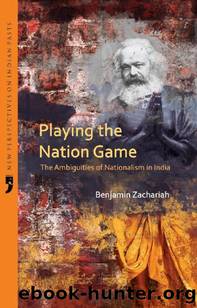Playing the Nation Game: The Ambiguities of Nationalism in India (New Perspectives on Indian Pasts) by Benjamin Zachariah

Author:Benjamin Zachariah [Zachariah, Benjamin]
Language: eng
Format: epub
Publisher: YODA PRESS
Published: 2020-03-28T00:00:00+00:00
Then there is the problem of territoriality: the âNehruvianâ state in India, like many states formed after a formal decolonisation process, inherited borders and boundaries that were set in place by a colonial power. To justify the ânaturalnessâ of that territory in terms of a ânationâ defined in âculturalâ terms becomes extremely difficult without making major exclusions; and yet there were many who made that attempt. Equally, in âdevelopmentalâ terms the alternative is to take the post-independence stateâs boundaries as given and not to talk too much about them. Inasmuch as the state had to legitimise its borders, the ânationalâ was a problem that could be deferred, but not suppressed.
The âdevelopmentalâ, thus, did not precede, replace or impede a project of âcultural nationalismâ (âcultureâ here often being a euphemism for âHinduâ or âmajoritarianâ), nor was it altogether separate from it. As an alternative to a âcultural nationalismâ, to the extent that it was one, it was never altogether hegemonic, as admitted by its own protagonists.6 Developmentalism was also a way for an elite which saw itself as progressive to keep its hold on the state.
Certain general questions emerge from this situation: is a âcivicâ nationalism a nationalism without characteristics specific to the ânationâ? Can it distinguish between the characteristics of its own nationals and those of other states? If it is unable to or refuses to do so, does it remain a nationalism? In practice, a âNehruvianâ nationalism is open to the charge (often levelled at it)
6 See for instance Z. A. Ahmadâs notes from his talk with Jawaharlal Nehru, June 1945, ânot to be shown to anyone else without P. C. Joshiâs [General Secretary, Communist Party of India] permissionâ, CPI documents, 1945/9, P. C. Joshi Archive, Jawaharlal Nehru University, New Delhi.
that it has no specific characteristics, or that it was too âforeignâ and not ârootedâ enough in the country whose nationalism it sought to be. This is on the one hand what makes it attractive to other states emerging from colonial rule with messy identitarian politics and heterogenous populations. On the other hand, this is what makes it vulnerable to those who seek a âproperâ nationalism with positive (âculturalâ?) characteristics that go back to âtime immemorialâ or an ancient, âclassicalâ past. So the âNehruvianâ (âcivicâ) nationalism is forced to confront its nonspecificity: it could just as easily be an Indian, an Indonesian or a Ghanaian nationalism. Since the âNehruviansâ cannot easily admit this without abandoning the legitimating framework of the nation-state, they must draw upon some specific characteristics. This leads to a calling upon the specific, which must be at least somewhat cultural.
If we are speaking here of inclusive civic belonging, everyone within the borders belongs to the state, regardless of caste, creed or religion. Exclusions are not civic but economic; whether this is preferable is debatable, but for the purposes of our question, a Nehruvian developmentalism appears to meet the criteria of a âcivil philosophyâ. It also meets the criterion of âeducatingâ people in âcivilityâ or âcivic virtueâ: there was a constant pedagogic project built into the Nehruvian developmental regime.
Download
This site does not store any files on its server. We only index and link to content provided by other sites. Please contact the content providers to delete copyright contents if any and email us, we'll remove relevant links or contents immediately.
The Secret History by Donna Tartt(19058)
The Social Justice Warrior Handbook by Lisa De Pasquale(12187)
Thirteen Reasons Why by Jay Asher(8894)
This Is How You Lose Her by Junot Diaz(6877)
Weapons of Math Destruction by Cathy O'Neil(6267)
Zero to One by Peter Thiel(5789)
Beartown by Fredrik Backman(5737)
The Myth of the Strong Leader by Archie Brown(5500)
The Fire Next Time by James Baldwin(5432)
How Democracies Die by Steven Levitsky & Daniel Ziblatt(5216)
Promise Me, Dad by Joe Biden(5144)
Stone's Rules by Roger Stone(5081)
A Higher Loyalty: Truth, Lies, and Leadership by James Comey(4954)
100 Deadly Skills by Clint Emerson(4921)
Rise and Kill First by Ronen Bergman(4780)
Secrecy World by Jake Bernstein(4742)
The David Icke Guide to the Global Conspiracy (and how to end it) by David Icke(4709)
The Farm by Tom Rob Smith(4502)
The Doomsday Machine by Daniel Ellsberg(4485)
